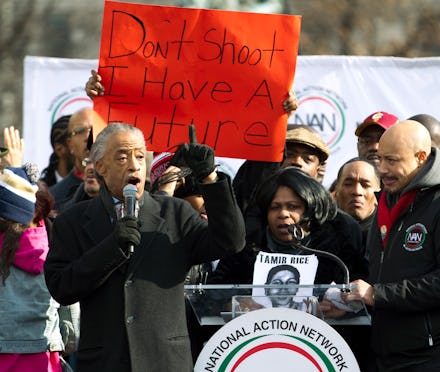Al Sharpton promises young black Americans this march will be all about them

Decades ago, civil rights movement-era protesters sang "we shall not be moved" when they marched against the forces seeking to deny them voting rights, economic equality and equal justice under the law.
On Saturday, a much younger crop of activists will carry that same tune as they convene for a national civil rights march in Washington, D.C.
The demonstration, billed as the "We Shall Not Be Moved" march, is the work of Rev. Al Sharpton's National Action Network, and is expected to draw thousands looking to send a message ahead of the inauguration of President-elect Donald Trump.
Sharpton said his civil rights group enlisted primarily millennial organizers to set strategy, mobilize participants and corral partner organizations willing to oppose the resurgence of anti-civil rights forces posed by a Republican takeover of the federal government.
"All of what we're saying has more to do with the interests of millennials than it does the older crowd," Sharpton said in an interview from his New York City offices Wednesday.
The issues
Activists fear the incoming Trump administration will de-emphasize voting rights, repeal the Affordable Care Act, halt criminal justice and policing reforms and enact draconian crackdowns on immigrant communities. Following the election, members of Congress and the president-elect's Cabinet picks have said they will do as much.
Saturday's march emphasizes four key civil rights issues that marchers don't want to see compromised under a Trump administration, Sharpton said.
"The Democrats have said that they want to work with incoming President Trump where they can and not in other areas," the civil rights leader said. "We're saying voting rights, criminal justice reform — that includes police misconduct — health care, jobs and economic justice should be off the table."
The marchers
For the next four to eight years, acts of resistance like Saturday's march must show millennials of color are a force to be reckoned, said Mary Pat Hector, National Action Network's national youth director.
"People will say that young people don't care about the issues that are impacting this country right now — and let me say that that can't be any further from the truth," Hector, a sophomore at Spelman College in Atlanta, said in a phone interview.
"This march, to me, is a moment in history that is a resurrection of a movement Dr. Martin Luther King started years ago," she said.
The march
It's far from coincidence that the march falls on the Martin Luther King Jr. Day holiday weekend, and six days before the inauguration, Sharpton said. On Saturday morning, marchers will meet outside of the National Sylvan Theater and march to West Potomac Park, located across from the King memorial monument.
At the park, marchers will rally with partnering organizations NAACP, the National Urban League, the National Council of La Raza and Planned Parenthood, among more than two dozen others.
NAN has arranged for more than 100 charter buses to bring marchers to the nation's capitol. Tylik McMillan, a sophomore at North Carolina A&T University, said he has been helping Hector book the buses for marchers coming from schools on the East Coast, including historically black colleges and universities.
"When you hear the voices of the people who are actually oppressed, it makes a bigger statement," McMillan said in a phone interview. "We want our people to do their civic duty, to be active in their government and to actually know what's going on and what's affecting them."
Sareana Kimia, 18, of Washington, D.C., said she is drawn to the march by the expected diversity of communities that will be represented.
"When people see signs that say 'black lives matter,' they assume it's just about black people," Kimia, a first-generation American of Southeast Asian heritage and president of the group Youth for National Change, said in an interview. "This is a way to rally behind and interface with members of other communities, too."
The last time Sharpton called a major march in Washington was December 2014, following months of protests over the police-involved deaths of Michael Brown in Ferguson, Missouri; Eric Garner and Akai Gurley in New York City; and Tamir Rice in Cleveland. The gathering angered a group of young Ferguson activists, who had attended the march and blasted organizers for not prominently acknowledging their role in galvanizing the nationwide anti-brutality protests.
"I learned that a lot of people put themselves above the cause," Sharpton said recalling the event.
Sharpton, 62, along with other veteran black civil rights leaders and politicians, has previously been the subject of criticism for seeming unwilling to cede his platform to a younger generation of activists. Those who believe that just aren't paying close enough attention, he said.
"I think that every organization has to build — not a platform for the young, but transition to the young," Sharpton said. "So as I build the next generation of National Action Network, and support [the youth], they have to be committed to what National Action Network is about — the principles of Dr. King, the principles of nonviolent social change."
Hector said she believes Saturday's event will prove millennials have learned from veteran activists and are ready to take their place on the front line.
"I think that what we're saying is, we're not going to continue to allow people make these decisions about us, without us at the table and without hearing our voices," Hector said.